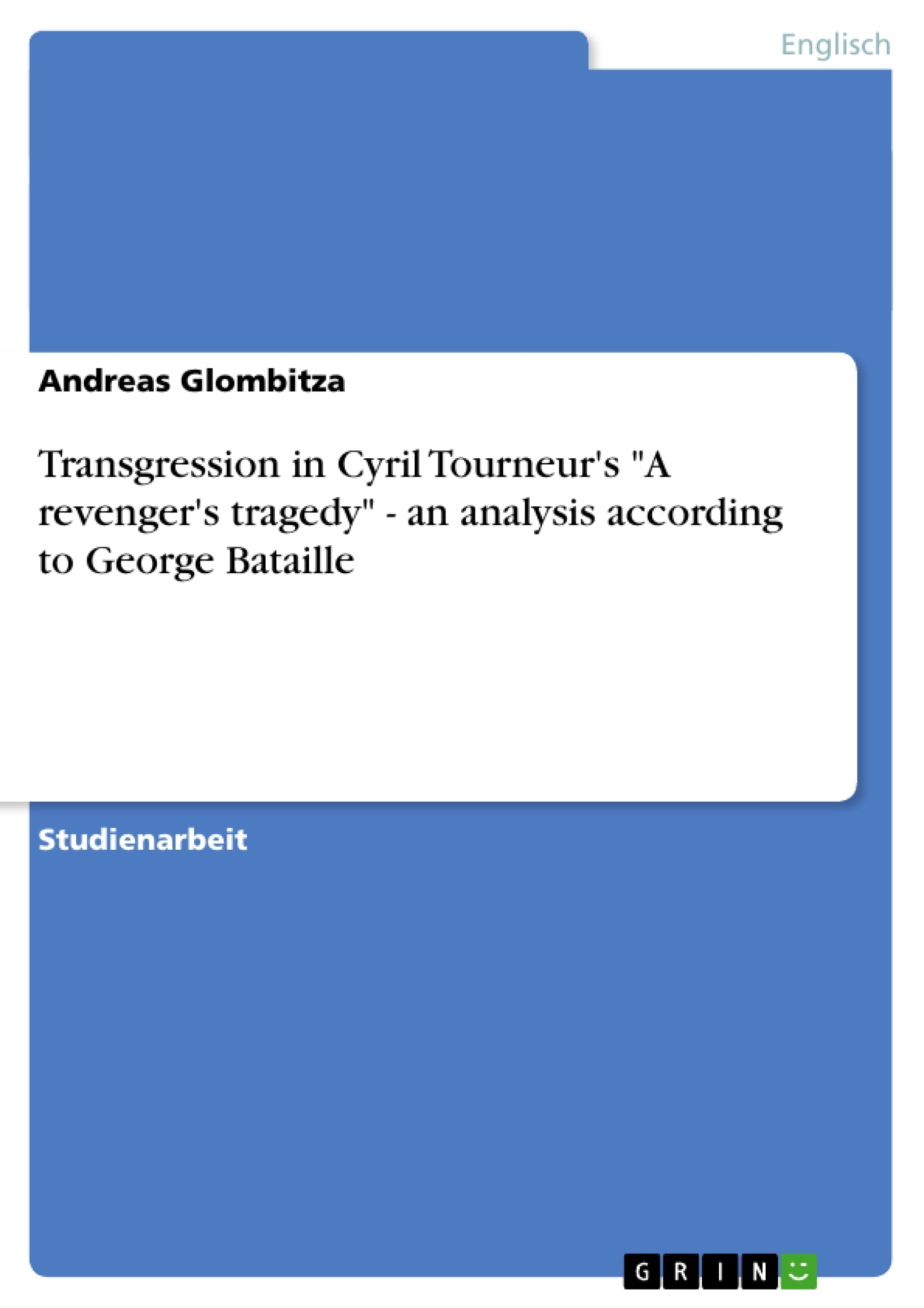Vindice, the protagonist of A Revenger’s Tragedy, is not easy to judge. When it comes to the question whether to condemn, applaud or pity him, we are caught within conflicting emotions. Undoubtedly, he and his brother commit acts of horrible violence – they nail down the dukes tongue with a dagger, force him to see his wife commit adultery with his own ‘bastard son’ and finally kill him. But nevertheless, and not without an uncanny after-taste, Vindice also inspires our sympathy.
The surrealist philosopher Georges Bataille has, within the frame of his integral work on life itself, worked out a theory of the social function of taboos and the necessity of their very definition by transgression. It is a concept of temporary permeability of inviolable borders which could provide an interesting and helpful framework for a closer examination of Vindice’s behaviour and its results.
After getting familiar with some of Bataille’s most basic concepts and particular features of his thought, we will try to determine the role Bataille attributes to the concept of taboo and transgression within society. A brief look at Michel Foucault’s discussion of this concept will complement to this. After having considered some complications concerning the Christian tradition, we should be able to concern ourselves with an according analysis of the play. A few introductory observations about plot, protagonist and underlying ideas will be necessary until we can finally try to employ the concept of transgression as our guide through the labyrinth of revenge.
Inhaltsverzeichnis
- 1. Introduction
- 2. Analysis
- 2.1 An outline of George Bataille's theory of transgression
- 2.1.1 The taboo and its social significance
- 2.1.2 Measuring a thin line: Michel Foucault's A Preface to Transgression
- 2.1.3 Transgression in Christian tradition
- 2.2 Discussion of A Revenger's Tragedy
- 2.2.1 Vindice as a revenger - a virtuous villain?
- 2.2.2 Vindice, Piato and the 'entirely other'
- 2.1 An outline of George Bataille's theory of transgression
- 3. Conclusion
Zielsetzung und Themenschwerpunkte
Die vorliegende Arbeit befasst sich mit der Figur des Vindice in Cyril Tourneurs "A Revenger's Tragedy". Ziel ist es, Vindices Verhalten und seine Auswirkungen im Kontext von Georges Batailles Theorie der Transgression zu analysieren.
- Batailles Theorie der Transgression und die Rolle des Tabus in der Gesellschaft
- Die Verbindung zwischen Transgression und Gewalt
- Die Bedeutung des 'entirely other' in Batailles Theorie
- Vindices Rolle als Transgressor und seine Ambivalenz
- Die Frage nach der moralischen Beurteilung von Vindices Handlungen
Zusammenfassung der Kapitel
1. Introduction
Die Einleitung stellt Vindice als Protagonisten von "A Revenger's Tragedy" vor und beschreibt seine ambivalente Figur. Sie führt den Leser in Georges Batailles Theorie der Transgression ein, die als analytischer Rahmen für die Arbeit dient.
2. Analysis
2.1 An outline of George Bataille's theory of transgression
Dieser Abschnitt erläutert Batailles Theorie der Transgression und ihre Bedeutung für die Analyse des menschlichen Verhaltens. Er untersucht die Rolle des Tabus in der Gesellschaft und die paradoxe Beziehung zwischen Wissen und Nicht-Wissen.
2.1.1 The taboo and its social significance
Dieser Abschnitt untersucht Batailles Analyse des Tabus, insbesondere des Tötungsverbots. Er zeigt, dass Tabus nicht unbedingt rational sind, sondern eine wichtige Funktion in der Regulierung von Gewalt haben.
2.1.2 Measuring a thin line: Michel Foucault's A Preface to Transgression
Dieser Abschnitt stellt Michel Foucaults Analyse des Tabus vor und betrachtet die schmale Grenze zwischen Transgression und Normalität. Er zeigt, wie Foucault Batailles Konzept der Transgression in seinen Kontext einordnet.
2.1.3 Transgression in Christian tradition
Dieser Abschnitt beleuchtet die Rolle der Transgression in der christlichen Tradition und analysiert ihre spezifischen Auswirkungen auf die Konzepte von Schuld und Vergebung.
2.2 Discussion of A Revenger's Tragedy
Dieser Abschnitt widmet sich der Analyse von "A Revenger's Tragedy" selbst. Er betrachtet Vindices Verhalten im Kontext von Batailles Theorie der Transgression und untersucht die Frage, ob er als virtuoser Schurke oder tragische Figur betrachtet werden kann.
2.2.1 Vindice as a revenger - a virtuous villain?
Dieser Abschnitt untersucht Vindices Rolle als Rächer und analysiert, ob seine Aktionen als moralisch gerechtfertigt oder verwerflich betrachtet werden können.
2.2.2 Vindice, Piato and the 'entirely other'
Dieser Abschnitt betrachtet Vindices Beziehung zu Piato im Kontext des 'entirely other' in Batailles Theorie. Er untersucht, wie die Verbindung zwischen den beiden Figuren die Grenzen von Moral und Transgression verwischen lässt.
Schlüsselwörter
Die Arbeit beschäftigt sich mit den Themen Transgression, Tabu, Gewalt, Rache, Moral, Philosophie, Literatur und die Werke von Georges Bataille, Michel Foucault und Cyril Tourneur.
Häufig gestellte Fragen
Worum geht es in der Analyse von "A Revenger's Tragedy"?
Die Arbeit analysiert die Figur des Vindice anhand von Georges Batailles Theorie der Transgression, um sein gewaltsames Verhalten und die sozialen Funktionen von Tabus zu untersuchen.
Welche Rolle spielt Georges Bataille in dieser Arbeit?
Bataille liefert den theoretischen Rahmen mit seinem Konzept der Transgression – der notwendigen Überschreitung unantastbarer Grenzen (Tabus) zur Definition gesellschaftlicher Normen.
Ist Vindice ein Held oder ein Schurke?
Die Arbeit untersucht Vindice als "virtuous villain" (tugendhaften Schurken). Er ist eine ambivalente Figur, die einerseits Abscheu durch Gewalt, andererseits Sympathie durch seine Motive erzeugt.
Was bedeutet "Transgression" in diesem Kontext?
Transgression bezeichnet das vorübergehende Durchbrechen von Tabus, wie zum Beispiel dem Tötungsverbot, und wie diese Akte die soziale Ordnung paradoxerweise festigen oder in Frage stellen.
Wie wird Michel Foucault in die Analyse einbezogen?
Foucaults Text "A Preface to Transgression" wird genutzt, um die schmale Grenze zwischen Normalität und Grenzüberschreitung sowie die Beziehung zwischen Wissen und Tabu zu beleuchten.
- Arbeit zitieren
- Andreas Glombitza (Autor:in), 2004, Transgression in Cyril Tourneur's "A revenger's tragedy" - an analysis according to George Bataille, München, GRIN Verlag, https://www.grin.com/document/33533



